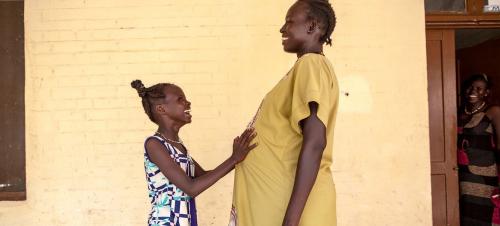Best reasons to stand up for mothers this Mother’s Day
For many mothers around the world, the month of May is an annual moment for them to receive thanks and recognition for all they do.

A pregnant woman and her daughter wait outside a UNICEF-supported maternity ward in South Sudan.
But, for hundreds of thousands of women globally, this gratitude only goes so far, the UN Population Fund (UNFPA) said on the occasion of Mother’s Day, observed on Sundays throughout May.
According to recently released data, a woman dies from pregnancy or childbirth every two minutes, with the vast majority of these deaths due to preventable causes like bleeding and infection, the UN reproductive health agency said.
What’s worse, solutions to these problems have existed for decades; but they require immediate investment in family planning and for the world to address its steep shortage of midwives, who UNFPA reports could prevent an estimated two thirds of all maternal and newborn deaths.
“We have the tools, knowledge and resources to end preventable maternal deaths; what we need now is the political will," UNFPA Executive Director Natalia Kanem said.
Here’s why mothers need support now more than ever before.
Maternal deaths at crisis levels
Between 2000 and 2015, global maternal mortality decreased by more than a third, but the rate of reduction has since stagnated across several regions and even reversed course in others, UNFPA reported.
This has resulted in a staggering 287,000 maternal deaths in 2020 – a death toll that would dominate headlines if it was tied to a natural disaster or other crisis, the agency showed.
"It is unacceptable that so many women continue to die needlessly in pregnancy and childbirth. Over 280,000 fatalities in a single year is unconscionable,” the UNFPA chief said. “We can and must do better.”
Dearth of choices
As often as not, women and girls do not get to make the decision to become pregnant, UNFPA said.
An alarming four in ten partnered women across 68 countries were unable to exert agency when it came to healthcare, sex or contraceptives. Meanwhile, some data suggests rape-related pregnancies occur at least as frequently as pregnancies arising from consensual sex.
These factors and others drive a neglected global crisis, in which almost half of all pregnancies around the world are unintended, leading to stark negative consequences for many of those affected, the agency said.
Complications from pregnancy and childbirth can be deadly, especially for adolescents and girls, UNFPA said, noting that an estimated half a million births were to girls aged 10-14 in 2021, making hundreds of thousands mothers while still in childhood.
The staggering number of unintended pregnancies represents a global failure to uphold women and girls’ basic human rights,” Ms. Kanem said.
Preferences ignored
In November 2022, the global population hit eight billion. While some met this news with admiration for the advances in health care and poverty reduction that have led to this landmark moment, others wrung their hands, worried about how there are “too many” or “too few” people on earth, according to UNFPA.
This line of thinking implicitly places women’s bodies in a position to be solutions to the supposed problem of population expansion – a dangerous idea. Historically, this reasoning has led to coercive policies designed to influence women’s fertility, which risk their rights while dismissing their desires, the agency said.
According to UNFPA’s 2023 State of the World Population report, 8 Billion Strong, many women want bigger or smaller families than they achieve.
Across most sub-Saharan African countries, for example, women report two or more births on average than desired, while a majority of childless women in Japan said they wanted children.
Further, in low and middle-income countries, as few as one in four women are realizing their desired fertility, the report showed.
“What women and mothers want when it comes to their fertility matters,” the agency said. “Unfortunately, too often, no one asks.”
Start with gender equality
Preventable maternal mortality, the denial of rights or demographic change, can all be addressed by making the world a more gender-equal place.
Of course, this is easier said than done, but gender inequality’s role at the root of so many other issues, including those mentioned above, must be recognized, the agency said.
Gender inequality is what keeps women out of the workforce and schools, vulnerable to conflict and violence, and denies them the right to make decisions about their own bodies and health, the agency said, adding that it is also what makes pregnancy a dangerous endeavour, one which hundreds of thousands of women do not survive.
“This Mother’s Day, mean it when you say thank you to the maternal figures in your life by work to save their lives. They will thank you in turn by thriving,” UNFPA said.
Source:UN
- 122 reads
Human Rights
Ringing FOWPAL’s Peace Bell for the World:Nobel Peace Prize Laureates’ Visions and Actions

Protecting the World’s Cultural Diversity for a Sustainable Future

The Peace Bell Resonates at the 27th Eurasian Economic Summit

Declaration of World Day of the Power of Hope Endorsed by People in 158 Nations

Puppet Show I International Friendship Day 2020

